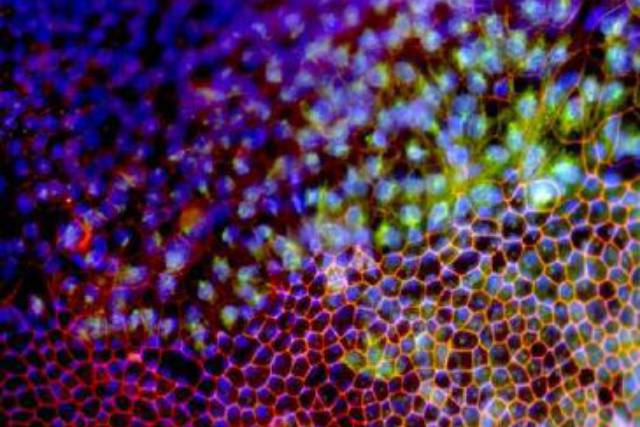PROCEDURE FOR OBTAINING A PURE CULTURE OF MULTICILIATED EPENDIMARY CELLS
Description
Ependymal cells are multiciliated epithelial cells that line the ventricular cavities of the brain and the central canal of the vertebrates spinal cord. These cells can participate in regeneration and tissue repair phenomena in the damaged nervous system or in neurodegeneration processes. It has been described that in these particular situations, cells can act as stem cells of the nervous system.
Having an ependymal cell culture model would allow the study of multiple aspects of cell biology, metabolism, physiology and the differentiation capacity of said cell type.
At present, cultures of these cells are obtained by procedures in which only heterogeneous populations of ependymal cells and other types of neural cells are achieved. These contaminating cells that accompany ependymal cells do not allow in vitro studies to be undertaken with minimal guarantees of success, and that is why having a pure culture of ependymal cells, in which there are no contaminating cells of any other type, would ensure the homogeneity of the results obtained and the reliability of the aforementioned in vitro studies.
Thus, the present invention proposes a solution that allows obtaining said pure culture by a method that includes as determining steps an incubation of the tissue in cold and a subsequent mild enzymatic digestion at 37ºC. Once ependymal cells and other neural cells are shed, they are all maintained in a basic environment where no neural cells survive except for these ependymal cells.
Advantages
The main advantage of the present invention lies in the fact that it provides a simple and inexpensive method for obtaining pure multiciliated ependymal cells, without the need to use much more complex methods such as immuno-classification ("magneticcellsorting" or "fluorescentcellsorting", which are used currently by other procedures.
Uses and Applications
The present invention is comprised in the field of cell cultures in cell biology, biomedicine and pharmacology. It will be of interest to:
• Work teams that need to use pure hair cell cultures, for their study or possible transformation into tumor cells, the so-called ependymomas.
• Groups involved in studies of pathologies whose etiology depends on a dysfunction of the cilia, the so-called ciliopathies.
Keywords
Sectors
Areas
Patent Number
ES242308B2
Applicants
UNIVERSIDAD DE MÁLAGA
Inventors
JESUS MATEOS GRONDONA, PABLO GRANADOS DURÁN, MANUEL CIFUENTES RUEDA, MARIA MARGARITA PEREZ MARTIN, JUAN PEREZ RODRIGUEZ, PEDRO FERNANDEZ, MARIA DE LOS DOLORES LOPEZ AVALOS
Filing Date
27/09/2011
Protection Level: National (Spain)
Processing Status: Spanish patent








